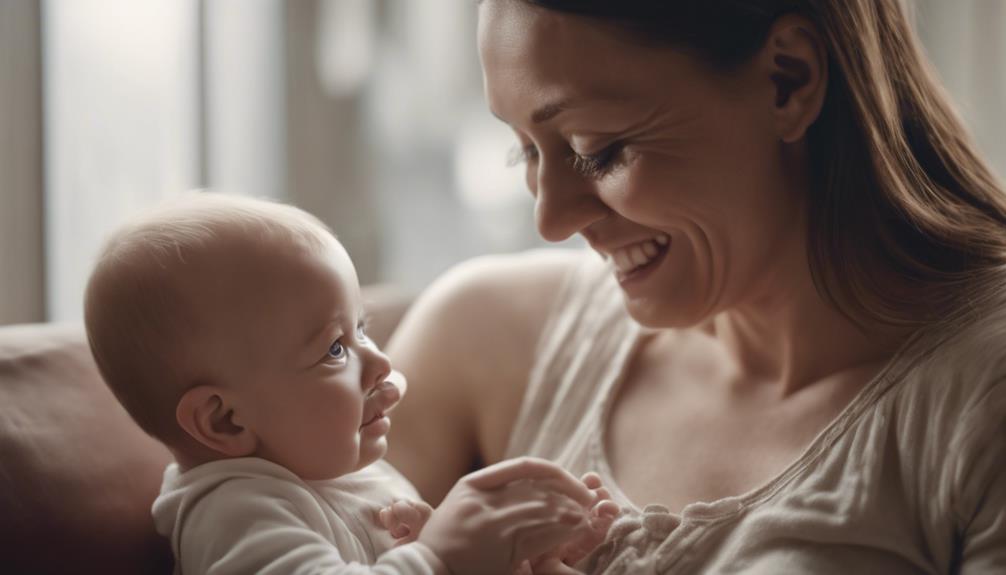In order to ensure a secure attachment with your baby, it is important to respond promptly to their cues and participate in bonding activities such as daily routines and interactive play. Creating a safe and nurturing environment is crucial for developing a strong emotional connection. These essential practices are the cornerstone for establishing a secure attachment bond, which is vital for your baby’s emotional and social growth. By prioritizing these basic steps, you are able to establish a stable and affectionate environment that promotes their emotional security and overall wellness. Mastering these methods is key to cultivating a healthy attachment bond with your little one.
Key Takeaways
- Establish consistent routines for feeding, sleeping, and playtime.
- Respond promptly to baby's cues and needs.
- Engage in positive interactions like cuddling, reading, and play.
- Provide a safe and nurturing environment.
- Build trust through consistent and loving care.
Understanding Secure Attachment
To understand secure attachment, recognize it as the emotional bond between a baby and their primary caregiver. It's vital for the baby's development as it provides a sense of security, trust, and comfort.
Building a secure attachment bond involves responding to the baby's needs promptly and consistently. This means being attuned to their cues, whether it be hunger, fatigue, or the need for affection. Responding to these needs helps the baby feel understood and cared for, laying the foundation for a strong attachment.
Nonverbal communication plays a significant role in this process, as it allows the caregiver to understand the baby's signals and respond appropriately. By meeting the baby's needs for food, rest, love, and comfort consistently, parents can create a secure attachment bond that forms the basis for healthy emotional and social development in the child.
Understanding these dynamics is key to fostering a nurturing environment for the baby's overall well-being.
Importance of Secure Attachment

Understanding the importance of secure attachment is essential for fostering healthy child development and well-being. Secure attachment plays a pivotal role in shaping a child's emotional security, self-esteem, and self-control.
Research indicates that children with secure attachments tend to exhibit higher levels of happiness, kindness, and success. Moreover, these children often have better relationships with others, both in childhood and later in life. Academically, children who are securely attached typically perform better, while also experiencing improved physical health.
Secure attachment sets the groundwork for fulfilling relationships in adulthood, highlighting its enduring impact on a child's overall well-being. The quality of the initial human bond significantly influences various aspects of a child's development, including academic performance, social skills, emotional well-being, and cognitive growth.
Secure attachment not only enhances memory and learning abilities but also plays a critical role in shaping a child's future success and relationships.
Parenting Tips for Attachment
To promote secure attachment with your baby, focus on bonding activities that foster connection, such as cuddling, playing, and engaging in interactive communication.
Be emotionally responsive to your baby's needs, offering comfort, support, and affection consistently.
Establishing consistent routines and providing a stable environment will help build a strong foundation for a secure attachment bond with your little one.
Bonding Activities
Engage in daily routines such as feeding, bathing, and bedtime to establish a strong bond with your baby. These bonding activities provide opportunities for positive touch, eye contact, and responsive interactions, essential for building trust and security.
Respond promptly to your baby's cries and cues, demonstrating that you hear and understand their needs. Incorporate skin-to-skin contact and cuddling into your daily routine to promote emotional connection and attachment.
Additionally, interactive play, singing, and reading sessions are great ways to strengthen the bond and foster attachment. Through these activities, you create a nurturing environment that helps your baby feel safe, loved, and connected.
Emotional Responsiveness
Incorporate emotional responsiveness into your interactions with your baby by consistently meeting their needs for comfort, love, and security. By responding promptly and sensitively to your baby's cues, you foster trust and build a strong attachment bond.
Research indicates that babies who experience emotional responsiveness tend to develop better social skills and emotional regulation. This practice contributes greatly to your baby's sense of security, which, in turn, plays an important role in promoting healthy brain development.
By establishing a foundation of emotional responsiveness, you help your baby feel safe, loved, and understood, which ultimately leads to a secure attachment. Remember, your consistent and loving responses to your baby's needs form the building blocks for a trusting and secure relationship.
Consistent Routines
Establishing consistent routines cultivates a sense of security and predictability for your baby, fostering a strong attachment between you and your infant. Essential routines, such as regular feeding and sleeping schedules, play a significant role in promoting emotional development.
Babies thrive on consistency, as it reduces anxiety and helps build a strong bond between caregiver and child. By following a routine, your baby can anticipate their needs being met, which in turn fosters trust and emotional stability. These consistent caregiving routines lay the groundwork for secure attachment by creating a foundation of safety and reliability in your baby's life.
Predictable routines not only enhance your baby's sense of security but also support healthy emotional development. By incorporating consistent routines into your daily life with your baby, you're providing them with the stability and reassurance they need to thrive and form a secure attachment with you.
Self-Care for Secure Attachment

Taking care of yourself is essential for fostering a secure attachment with your baby. By prioritizing your physical and mental well-being, you can better meet your baby's needs with patience and consistency.
Ensuring parental emotional availability and maintaining consistent caregiving practices are key components of self-care that contribute to a healthy and secure attachment relationship.
Parental Emotional Availability
Prioritize your emotional well-being as a parent to nurture secure attachment with your baby. Parental emotional availability plays a significant role in fostering secure attachment, which is vital for your baby's healthy development.
Engaging in self-care practices is essential for regulating your emotions and providing consistent, nurturing responses to your baby's needs. By taking care of your mental health, you create a safe and supportive environment that promotes trust, bonding, and overall well-being in the parent-child relationship.
Being emotionally present and responsive to your baby's cues establishes a strong foundation for secure attachment. This emotional availability allows your baby to feel secure, supported, and understood, leading to a deeper connection and positive developmental outcomes.
Consistent Caregiving Practices
To build a secure attachment with your baby, ensuring consistent caregiving practices is vital for both their well-being and your own. Consistency in caregiving, such as responding promptly to your baby's cues and establishing routines for feeding, sleeping, and playtime, fosters trust and security in the attachment bond. These practices help your baby feel secure and nurtured, promoting emotional stability and aiding in the development of a sense of security. Secure attachment is further strengthened through predictable and loving interactions between you and your baby. Additionally, practicing self-care is essential for maintaining a positive and responsive relationship with your baby. By taking care of yourself, you are better equipped to provide the consistent care and attention necessary for a secure attachment to flourish. Check out the table below for a quick reference on how consistent caregiving practices contribute to building a secure attachment:
| Consistent Caregiving Practices | Benefits |
|---|---|
| Responding promptly to cues | Builds trust and security |
| Establishing routines | Promotes emotional stability |
| Practicing self-care | Maintains positive relationship |
Recognizing Baby's Cues

Pay close attention to your baby's facial expressions, body language, and vocalizations as these cues are essential for understanding their needs. Recognizing these cues will enable you to respond promptly and appropriately, fostering a secure attachment with your little one.
Here are three key ways in which babies communicate their needs:
- Crying: This is the primary way infants communicate distress, hunger, discomfort, or fatigue. Understanding the different types of cries can help you address their needs effectively.
- Cooing: Babbling sounds and cooing are ways babies express contentment and happiness. Responding to these sounds positively reinforces their sense of security.
- Eye Contact and Gestures: Babies use eye contact, pointing, and other gestures to engage with caregivers and convey their desires. Acknowledging and responding to these cues strengthens the bond between you and your baby.
Creating Secure Sleep Environment

For a secure sleep environment for your baby, remember to always place them on their back to reduce the risk of SIDS. This position is vital for promoting safe sleep and minimizing the chances of sudden infant death syndrome.
Additionally, make sure that the crib has a firm mattress with a fitted sheet and avoid using loose bedding or soft toys that could pose a suffocation hazard.
Maintaining a comfortable room temperature between 68-72°F is essential for creating a conducive sleeping environment for your baby. Consider incorporating white noise machines or gentle lullabies to help soothe your baby to sleep, fostering a sense of security and comfort.
Developing a consistent bedtime routine can also aid in signaling to your baby that it's time to rest, further enhancing their sleep quality. By adhering to these practices, you can create a secure sleep environment that promotes attachment and overall well-being for your baby.
Communication and Play

In order to foster a strong attachment with your baby, engaging in interactive play that promotes bonding and communication is crucial.
By incorporating dialogues and non-verbal connections, such as eye contact and gentle touch, you can create a nurturing environment for your little one.
Play not only aids in brain development and emotional regulation but also strengthens the parent-child relationship, laying a solid foundation for your baby's future well-being.
Bond Through Play
Engage in interactive play with your baby to foster secure attachment and enhance communication skills. Play isn't just a vital avenue; it serves as an essential avenue for building strong bonds with your little one. Here's how you can strengthen your relationship through play:
- Create a Safe Environment:
Guarantee the play area is free from hazards, allowing your baby to explore and interact without worry. This sets the stage for a secure and nurturing play experience.
- Follow Your Baby's Lead:
Observe your baby's cues and interests during playtime. By joining in on activities they enjoy, you show them that you value their choices and are actively engaged in their world.
- Be Present and Responsive:
Respond to your baby's sounds, gestures, and expressions promptly. This responsiveness fosters a sense of security and trust, laying the foundation for a strong attachment bond between you and your little one.
Engage in Dialogues
Begin conversations with your baby to nurture a strong attachment bond through interactive communication and play. Engaging in dialogues with your infant is vital for fostering responsive communication and promoting emotional connection. Through playful interactions, you not only enhance cognitive development and problem-solving abilities in your baby but also lay the foundation for language skills and emotional regulation. These dialogues help your little one understand the world around them and build trust in their relationship with you. Establishing a pattern of responsive communication and play can boost your baby's confidence, encourage exploration, and strengthen the bond you share. By actively participating in dialogues with your baby, you create a supportive environment that facilitates social interactions, language development, and emotional well-being.
| Benefits of Engaging in Dialogues | How it Helps |
|---|---|
| Promotes emotional connection | Builds trust |
| Enhances cognitive development | Fosters language skills |
| Encourages exploration | Boosts confidence |
| Strengthens bond with caregiver | Develops social interactions |
Non-Verbal Connections
Establishing non-verbal connections through communication and play is essential for fostering a secure attachment with your baby. When engaging with your little one, remember the importance of non-verbal cues such as tone of voice, facial expressions, and gestures.
Here are some key practices to enhance these connections:
- Use a soothing and affectionate tone of voice: Your baby is sensitive to the way you speak. A gentle and loving tone can convey warmth and security, strengthening your bond.
- Express emotions through facial expressions: Smiling, making eye contact, and mirroring your baby's expressions can create a positive and engaging interaction, promoting feelings of trust and connection.
- Utilize non-verbal cues during play: Incorporate gentle touches, cuddling, and interactive games like peek-a-boo to communicate love and attentiveness without words. These actions reassure your baby and reinforce the secure attachment you share.
Embracing Imperfections

How can embracing imperfections as a caregiver enhance your bond with your baby?
Acknowledging your imperfections and learning from them can greatly impact the parent-child relationship. By demonstrating vulnerability and humility, you create an environment where your baby feels safe, loved, and accepted unconditionally. Trust is built through the acknowledgment of mistakes, fostering resilience in both you and your baby.
Embracing imperfections not only allows for genuine interactions but also promotes a growth mindset, imparting valuable lessons in acceptance and forgiveness to your child. This approach creates a foundation for emotional bonding and strengthens the attachment between you and your baby.
It's essential to remember that perfection isn't a requirement for a secure and loving relationship with your child. Embracing imperfections opens up opportunities for growth, connection, and mutual understanding in the intricate dance of parenting.
Involving Fathers in Attachment
Fathers play an essential role in nurturing secure attachment with their children through emotional support and positive interactions. Involving fathers in the attachment process can greatly impact a child's development:
- Enhanced Cognitive Development:
Research indicates that children with involved fathers demonstrate better cognitive skills, problem-solving abilities, and academic performance.
- Improved Social Skills:
When fathers engage in bonding activities like playing and reading with their children, it fosters stronger social connections, empathy, and communication skills.
- Better Emotional Regulation:
Paternal involvement in caregiving tasks helps children regulate their emotions, cope with stress, and build resilience for handling challenges in life.
Overcoming Attachment Challenges

When facing attachment challenges, it's important to address underlying factors that may hinder the emotional connection between parents and their babies. Parents who've an insecure attachment history may find it challenging to form a securely attached bond with their child, as past experiences can impact their ability to create a strong emotional connection.
Emotional problems such as depression and anxiety can also interfere with the attachment process, making it essential to seek appropriate support. Additionally, issues like drug or alcohol problems in parents can further complicate the establishment of a secure attachment with their babies.
High levels of stress from various sources can also play a role in hindering the development of a healthy attachment bond. To overcome these challenges, seeking additional resources such as therapy options can provide valuable support for parents struggling to create a secure attachment with their babies, aligning with the principles of attachment theory.
Frequently Asked Questions
How to Ensure Baby Has Secure Attachment?
To guarantee your baby has secure attachment, respond consistently to their cues, establish a primary caregiver, show affection through smiling and cuddling, engage in interactive play, and find a balance between meeting their needs and taking care of yourself.
What Are the 4 Key Points on the Importance of Secure Attachment?
You need to understand the 4 key points on the importance of secure attachment. It promotes trust, empathy, brain development, and social skills. Kids with secure attachments are happier, kinder, and better equipped for life's challenges.
What Are 3 Ways You Can Promote Secure Attachments in a Infant or Toddler Room?
To promote secure attachments in an infant or toddler room, you should be consistent with routines, respond promptly to cues, and engage in positive interactions. Creating a safe, loving environment and tailoring care to individual needs are key.
What Are the 4 Pillars of Secure Attachment?
To guarantee secure attachment, remember the four pillars: consistency, responsiveness, understanding your child's needs, and positive interactions. By being consistent, responsive, attentive, and loving, you can build a strong bond with your baby.
Conclusion
In summary, ensuring secure attachment with your baby is vital for their emotional development and well-being.
By following key practices such as understanding your baby's cues, communicating effectively, and involving fathers in caregiving, you can strengthen the bond between you and your child.
Remember, even in challenging times, providing a safe and loving environment for your baby is the foundation for a healthy attachment relationship that will benefit them for years to come.









